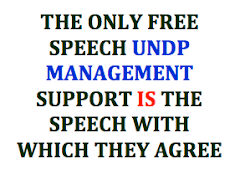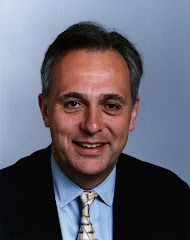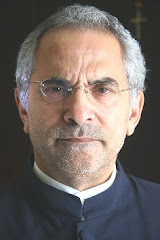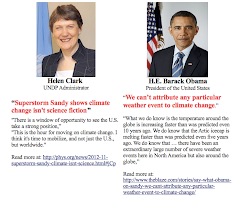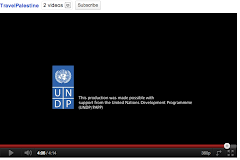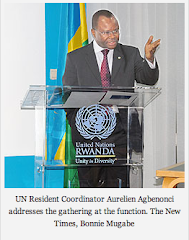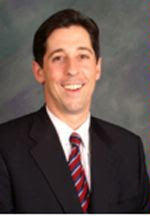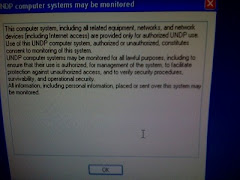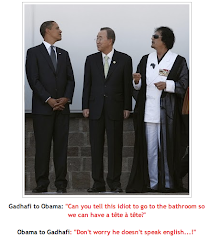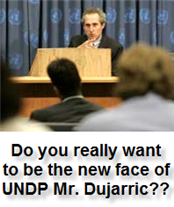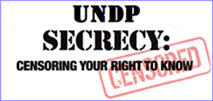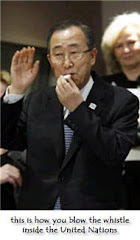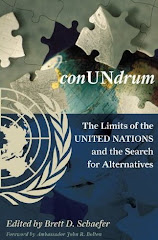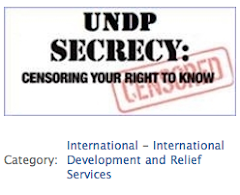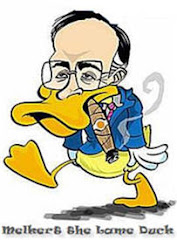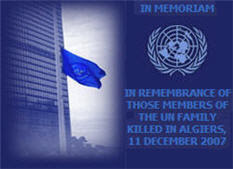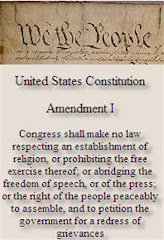Tuesday, April 29, 2008
More nefarious proposals from Kemal Dervis & Associates
of the Paris Declaration on Aid Effectiveness (first phase)"
20. UNDG should make increased use of national systems for support services, when appropriate and to the benefit of the partner countries, in order to strengthen national capacities and reduce transaction costs. Such support services include: procurement, security, information technology, telecommunications and banking, as well as planning, reporting and evaluation.
21. UNDG should further harmonize and simplify its business practices in order to increase the accountability and transparency of operational activities while ensuring that development assistance to partner countries is provided in a coherent fashion that supports capacity development. Practices that could be improved include: budgeting, audit functions, procurement systems, and professional expertise, including the adoption of the International Public Sector Accounting Standards.
22. UNDG should measure the cost of non-harmonized approaches to development assistance and further standardize and harmonize the concepts and practices to reduce transaction costs.
23. UNDG should create specific, measurable, achievable and relevant results frameworks and strategies that enable partner countries to design, monitor and evaluate results in the development of their capacities at different levels to achieve national development goals and progress towards the internationally agreed development goals, including the Millennium Development Goals.
24. It is recommended that UNDG encourage governments of partner countries to initiate and conduct joint and country-led evaluations to assess the contribution of the United Nations development system to national development plans and strategies, and to systematize and disseminate lessons learned from these exercises as mechanisms for mutual accountability.
25. UNDG should reinforce its commitment to strengthening the capacity of partner countries, at their request and with their ownership and leadership, to coordinate external assistance, including system-wide and sector-wide approaches and budget support, and to make the best possible use of such assistance, especially by being involved in national planning and monitoring processes and linking the aid effectiveness agenda to the broader development effectiveness
agenda.
26. UNDG should harmonize its approach among its members and other development partners to strengthen national capacities. Capacity development is commonly associated with various forms of support aimed at individuals (training), institutions (organizational development) and the enabling environment (support to policies and strategies). UNDG should contribute to the capacity of partner countries to optimize the use of new aid modalities.
27. UNDG should further develop and strengthen its knowledge management systems and expertise, including resources available at the regional level and from non-resident organizations, to better assist partner country needs for capacity development.
28. Incentives to implement the Paris Declaration on Aid Effectiveness should address directly the factors that stand in the way of progress, especially with respect to harmonization. UNDG should address the structural obstacles to the adherence of the Paris Declaration principles as part of the broader United Nations reform process. This goes beyond the subject of the present evaluation, which addresses the implementation of the Paris Declaration, though it clearly affects the ability of UNDG to deliver development assistance efficiently.
29. UNDG should adopt a complementary approach to incorporating cross-cutting issues like gender mainstreaming, capacity development and rural development, as was done in response to HIV/AIDS. In addition, UNCTs should review the adequacy of their arrangements and efforts aimed at gender equality and rural development in countries with substantial rural poverty by going beyond social concerns and addressing rural poverty on a sustainable basis, thus recognizing in a systematic way the need for improvements in production and income.
Wednesday, April 23, 2008
UNDP Procurement: Curiouser and Curiouser

By George Russell
The United Nations Development Program’s procurement of airport body scanners last year on behalf of the Hugo Chavez government in Venezuela is generating controversy within U.N. Headquarters, as UNDP attempts to justify its actions.
On Thursday, UNDP posted a letter on its own web site from the scanners’ American manufacturer which ostensibly confirmed that the Venezuelan company which won UNDP’s procurement contract had purchased the scanners for UNDP’s project on August 30, 2007.
To see the letter, click here.
The problem is that the date and purchase order number cited in the letter do not match those in an official document from the same manufacturer that UNDP posted on its website two weeks ago. The older document, a notarized “certificate of origin” UNDP says was used to ship the equipment to Venezuela, asserts that the purchase was made on August 8, 2007 — three full weeks before the latest letter says the scanner purchase even existed.
To see the "certificate of origin," click here.
Casting even more confusion into the case, a letter from the Venezuelan company, Setronix C.A., to FOX News cites another date for UNDP’s purchase order: August 1, 2007 — putting the alleged deal a full month earlier than the manufacturer now says it took place.
The same letter claims that the number of scanners involved in the order had dropped from 19 to 17 — despite UNDP’s previous confirmation of the higher number in communications with FOX — because the company had tacked on an expensive three-year service package onto the deal after UNDP approved the procurement.
To see the Setronix letter, click here.
Yet copies of confidential UNDP headquarters procurement documents obtained by FOX News, which waived competitive bidding on the procurement, specifically note that the 19-scanner deal already included such a three-year service package.
To see the headquarters documents, click here.
The letter posted yesterday by UNDP from the scanner manufacturer, L-3 Communications, is only the latest in a blizzard of documentation UNDP has been posting to justify the “objectivity, transparency, efficiency” of the $2,375,000 scanner procurement, which UNDP says took place as part of an effort to modernize the customs service of Chavez’s radical leftist regime.
On April 1, FOX News questioned the deal on the basis of the UNDP headquarters waiver of competition, and after the highly respected U.S. defense contractor that manufactured the equipment, L3 Communications, declared that it had only shipped 17 scanners to Venezuela, and these were for the country’s correctional system, not the customs and tax authority cited by UNDP.
Two days later, UNDP posted documents on its website which FOX News pointed out contained different totals for the scanners, offered two different dates for the same purchase order, and produced a “project document” for the deal that terminated 3 1/2 years before the purchase was made, and never mentioned airports or scanners at all.
As part of its latest documentation drive, UNDP yesterday produced additional documents on its website, which it said made clear that the original project document had been extended several times, into 2008.
The website emphasized that “had [FOX] checked with UNDP before publishing, we would have been pleased” to point out that fact.
The internal properties of the electronic PDF file that UNDP posted show that the project extension documents were not assembled as an electronic file until April 9, 2008, or five days after FOX pointed out the deficiencies of the initial “project document.”
Tuesday, April 22, 2008
UNDP Documents show Setronix a supplier to the Quartermaster General of National Arm Forces of Venezuela
 The saga of the scanners for Venezuela continue, raising more and more suspicion on the existence of such procurement and the continuing involvement of UNDP in dirty deals with dictators around the world. Now UNDP publish documents which prove that Setronix, the contractor selected from UNDP in a waiver of competitive biding, was and still is a supplier for the quartermaster general for National Arm Forces of Venezuela.
The saga of the scanners for Venezuela continue, raising more and more suspicion on the existence of such procurement and the continuing involvement of UNDP in dirty deals with dictators around the world. Now UNDP publish documents which prove that Setronix, the contractor selected from UNDP in a waiver of competitive biding, was and still is a supplier for the quartermaster general for National Arm Forces of Venezuela.On April 16th UNDP's David Morrison continued with it's version of the Venezuela story. UNDP produced in their For-the-record (blog) two documents from Setronix which were supposed to prove the existence of the scanners.
David Morrison stated that:
Number of scanners: The original number of scanners was 19. During the
lengthy procurement process, however, the price of the scanners went up. Precisely to accommodate this contingency, UNDP Resident Representatives are given limited authority to adjust contracts accordingly. On the scanner contract, after consulting with SENIAT, UNDP reduced the number of scanners to 17, and increased the overall amount of the contract by $5000. Even at the increased price, the L3 Communications scanners were much less expensive than those in rival bids.The procurement was done in two shipments, one for 16 scanners and the other for one scanner. (Click on following two links to view the documents for all 17 scanners: 1, 2).
First of all both these document clearly indicate that Setronix was and is a supplier for the Quartermaster General for National Arm Forces of Venezuela. Instead of proof of arrivals documents are direct indisputable proof of movement/shipment of equipment from one military base to another. Raising direct question of allege use of equipment from "public".

The problem is that both documents produced from UNDP are neither the Certificates of Customs nor the Lending Certificates which, as per UNDP procurement rules, would have been proof of shipment. Both documents are hand created documents which describes the transportation of certain equipment from one city to another city in Venezuela, and nor the dates nor the cities mentioned in the both documents refer to the port of arrival (or airport) of the initial L3 document which UNDP put online.

More important is that the latest document produced from UNDP (2) has been produced on April 3 - 2008, only days after the first story of FOX NEWS, and it contains a different seal of SENIAT on the document. This date is totally different with the statement of Setronix that the equipment arrived in Venezuela in Nov 2007.

But more important is that in the letter to FOX NEWS on April 11, 2008 , Setronix - the UNDP's contractor admits that the 1 unit out of 17 left Miami International airport and arrived at Simon Bolivar International Airport in Venezuela on Nov 11, 2007. (while in the alleged certificate is indicated April 3, 2008). In the same document Setronix indicate that they had received from UNDP - 90% of the contract payment. While none of the documents provided above is prove of existence or of the implementation of the said scanners in any given Venezuelan public Airport, nor they prove that such equipment are for public use by public administration and not the military (as in fact stated in both docs 1, 2)
Based on UNDP internal processes and rules, the above raises important questions:
- So who at UNDP's Venezuela Office cleared this procurement ?
- Who went to the receiving airport or port customs to receive the goods and clear the goods ?
- Who signed on PO and released the 90% of the payments and based on which proof of goods and certificate of good-condition?
- Who cleared this payment at UNDP's HQs Finance Unit and based on which supporting documentation?
Where are the pictures of the equipments purchased from UNDP ?
Friday, April 18, 2008
Herfkens wil vergoedingen niet terugbetalen

Uitgegeven: 17 april 2008 21:22
Laatst gewijzigd: 17 april 2008 21:58
DEN HAAG - Oud-minister Eveline Herfkens wil de ten onrechte aan haar betaalde vergoedingen van het ministerie van Buitenlandse Zaken echt niet terugbetalen. Het departement heeft een aantal malen contact met haar gehad over terugvordering, maar Herfkens wil hier niet aan meewerken.
Dat zei minister Maxime Verhagen (Buitenlandse Zaken) donderdag in een overleg in de Tweede Kamer over de kwestie. Herfkens wil volgens de minister niet terugbetalen, omdat dit de suggestie zou wekken dat ze schuldig is.
"Naar haar mening is het geld aangeboden door Buitenlandse Zaken en wist zij niet dat het niet mocht", aldus Verhagen.
Huur
Herfkens ontving als medewerkster van de VN-organisatie UNDP jarenlang een vergoeding voor de huur van haar woning in New York. Het ging omgerekend om ongeveer 190.000 euro.
Volgens de regels van de VN mag dat niet. Ook enkele anderen kregen onterechte vergoedingen, zo bleek na onderzoek. Zowel Verhagen als de Kamer spraken al eerder uit dat het onverteerbaar is dat zo met belastinggeld is omgesprongen.
Onderzoek
De VN is zelf nog bezig met een onderzoek naar de gang van zaken. Verhagen wil dat afwachten. Als hieruit blijkt dat Herfkens willens en wetens wist dat ze onterecht deze gelden kreeg, zal hij volledig gaan terugvorderen.
De Tweede Kamer steunt dat, ook de PvdA, de eigen partij van Herfkens.
Schikking
De oppositiepartijen SP, VVD, PVV en GroenLinks willen verder gaan en eisen dat Herfkens direct terugbetaalt of een schikking wordt getroffen.
Verhagen wil echter het VN-onderzoek afwachten, omdat hij dan eventueel het hele bedrag kan terugvorderen. Zolang de uitkomst van het onderzoek niet duidelijk is, heeft het departement geen poot om op te staan.
Ook een verzoek van GroenLinks om minister van Staat Wim Kok in deze zaak te laten bemiddelen, vindt Verhagen niet zinvol en wees hij af. Volgens hem leidt dat nu niet tot een andere uitkomst.
Herfkens weigert terug te betalen
 Gepubliceerd: 18 april 2008 10:41 Gewijzigd: 18 april 2008 10:42
Gepubliceerd: 18 april 2008 10:41 Gewijzigd: 18 april 2008 10:42Door een onzer redacteuren
Den Haag, 18 april. Oud-minister Evelien Herfkens heeft tot twee keer toe geweigerd de haar ten onrechte door het ministerie van Buitenlandse Zaken verstrekte huursubsidie voor een appartement in New York terug te betalen.
Dit heeft minister Verhagen (Buitenlandse Zaken, CDA) gisteravond gezegd in de Tweede Kamer.
Volgens de minister stelt Herfkens dat terugbetaling een schuldigverklaring zou inhouden. Zij staat juist op het standpunt dat ze te goeder trouw heeft gehandeld. Het ministerie van Buitenlandse Zaken heeft eerder al erkend dat de subsidie aan Herfkens in strijd is met de regels van de Verenigde Naties waar zij in 2002 aan het werk ging. Maar minister Verhagen ziet vooralsnog geen juridische mogelijkheden de met de huurtoelage gemoeide 280.000 dollar terug te vorderen. Dat kan pas als blijkt dat Herfkens de VN-regels willens en wetens heeft overtreden. Een intern onderzoek van de volkerenorganisatie zal dit moeten uitwijzen.
Herfkens kreeg de subsidie in het kader van een regeling voor Nederlandse diplomaten die naar het buitenland worden uitgezonden. Herfkens was echter niet in dienst van het departement, maar van de UNDP, de ontwikkelingsorganisatie van de VN. Deze organisatie verbiedt expliciet financiële toelages van lidstaten aan hun landgenoten om de onafhankelijkheid te waarborgen.
Een meerderheid van de Tweede Kamer vindt dat Buitenlandse Zaken er alles aan moet doen de ten onrechte verstrekte subsidie terug te krijgen. Het steekt de parlementariërs vooral dat Herfkens, de PvdA politica die in het tweede kabinet Kok minister voor Ontwikkelingssamenwerking was, tot nu toe geen enkel berouw heeft getoond. Ze heeft de ophef over haar vergoeding altijd als overdreven afgedaan. Ter verdediging zei Herfkens onder andere dat zij geen zin had in „een flat met uitzicht op een blinde muur”.
From Cyprus, Benon Sevan Weighs In

By Claudia Rosett
Yes, you read that right. None other than former UN Oil-for-Food chief Benon Sevan is at least virtually back in action, piping up online even though he’s still living as a fugitive from U.S. law, on Cyprus. Writing in the Yerevan-based Armenian AZG Daily, Sevan (an Armenian Cypriot) has tossed his hat back into the public ring — scolding UN Secretary-General Ban Ki-Moon for ending the tenure on Cyprus of UN Special Representative Michael Moller. Here’s a link to Sevan’s article, and just in case that vanishes from the web, here’s a saved copy.
You remember Benon Sevan. A longtime UN staffer, he was hand-picked by Kofi Annan in 1997 to head the UN Oil-for-Food program, which he did until it ended in 2003. Before the conclusion of the ensuing UN investigation, while Annan’s office was assuring the press that Sevan was cooperating, he quietly slipped out of New York and returned to his native Cyprus, beyond reach of U.S. extradition. In January, 2007, Sevan was indicted in the Southern District of New York on charges of bribery and conspiracy to defraud the UN Oil-for-Food program, with U.S. federal prosecutors alleging Sevan had received about $160,000 in illicit commissions on UN-overseen Iraqi oil deals channeled via a Panamanian company of an alleged co-conspirator based in Switzerland (who happened to be an in-law of former UN Secretary-General Boutros Boutros-Ghali). From Cyprus, Sevan has denied any wrong-doing. I last saw him when I paid a surprise call on him in Nicosia, Cyprus, in 2006 — which I wrote up for the Wall Street Journal. Sevan insisted, “I am not running away.” But he doesn’t seem to have done much traveling off Cyprus either.
Why would Sevan now choose to weigh in on the departure from Cyprus of Kofi Annan-appointee and UN special rep, Michael Moller? Maybe, as Sevan insisted when I spoke with him two years ago on Cyprus, he just has the best interests of the UN at heart. But there has been a certain amount of scuttlebut over the past few years from sources afraid to be named — but enough separate sources by now so that I credit this as broadly accurate — that Moller and Sevan, old buddies from Sevan’s UN days, have spent a certain amount of time together — dining out at the Nicosia Hilton, and generally keeping in touch. Is it possible there’s been a certain amount of UN hand-holding that Sevan might now miss?
For now, I’ll leave it with a few more questions: Does Ban Ki-Moon think it’s a good idea for UN staff to go on rubbing elbows with Benon Sevan on Cyprus? If Benon Sevan is so eager to be heard, why not come back to New York, and face the charges? And why have both Kofi Annan and Ban Ki-Moon appeared so profoundly indifferent to whether he does or not?
P.S. - While we’re on the subject, when might the UN deign to tell us whether Sevan’s costs of moving back to Cyprus in 2005 — airfare and household freight — were paid, during the UN investigations, out of the UN budget?
UNDP Procurement: Exceptions Are the Rule
 By George Russell
By George RussellThe United Nations Development Program (UNDP), the U.N.’s anti-poverty flagship, has overridden its own rules requiring competitive bidding for procurement contracts on more than half of the $1.5 billion in goods and services it paid for over the past three years, an investigation by FOX News has determined.
Confidential UNDP procurement documents obtained by FOX show that over the past three years, the development agency has waived competitive bidding procedures for goods and services worth $879 million, roughly 58 percent of the total it disbursed during that time.
The value of the waivers ranged from $259 million, or 50 percent of total purchases in 2005, to a high of $409 million, or two-thirds of the total for 2006, before settling back to $210 million, or 54 percent of the total last year.
The totals are “shocking,” and “scandalous,” according to William Easterly, a former World Bank economist, who is currently a visiting fellow at the left-leaning Brookings Institution in Washington D.C. “There could be some extraordinary circumstances involved, but even those cannot possibly explain why the bulk of UNDP operations are waivers of competition.”
The waiver tallies were compiled by UNDP’s Advisory Committee on Procurement (ACP), which records the actions that four UNDP regional procurement committees take in more than 160 countries, and additionally must approve all waivers of competitive bidding on contracts worth $1 million or more.
In reply to a series of questions by FOX News regarding the awards and waivers, UNDP reported the overall awards in the same amount as shown on the documents obtained by FOX News. But in recording the waivers, UNDP offered a different interpretation..
Arguing that the term “waiver of competitive bidding” covered many circumstances, UNDP replied that true “exceptions to competitive bidding” totaled only $78 million in 2005, $120 million in 2006, and $99 million in 2007 — or just 20 percent of the procurement total.
The remainder of the waivers, UNDP said, were cases where “full competitive bidding” took place, “but where the outcome is less than 3 fully qualified offers.” This happens, UNDP spokesman David Morris said, “for reasons outside of UNDP’s control,” such as lack of attention from suppliers, “or for a number of other reasons.”
Morrison added that “UNDP acknowledges that using the same term to cover these two very different sets of circumstances can lead to confusion.”
That “confusion,” however, is embedded in UNDP’s own internal documents, where the distinction Morrison makes does not exist.
The same UNDP documents also show that by far the largest and most frequent requests for UNDP procurement cash — and their subsequent approvals — come from countries with questionable track records for government honesty and transparency. Among the big winners are the Democratic Republic of Congo, Sudan, Honduras and Iraq.
The volume of procurement funds requested for the Democratic Republic of Congo alone in 2006 — $264 million — represented 82 percent of that year’s entire UNDP African regional bureau requests. The tallies also record that Congo was the African country with the greatest value of procurement spending approved in each of the three years covered in the documents obtained by FOX. The UNDP documents do not state the actual value of the agency’s Congo funding approvals, and do not break out the amount of that money obtained through waivers of competitive bidding.
To see the UNDP documents, click here (large PDF: Firefox preferred).
In 2005, the Democratic Republic of Congo (DRC) ranked 144th on the “corruption perception index” of Transparency International, a private anti-corruption watchdog, while the U.S., by contrast, ranked 17th (and Iceland ranked 1st). In 2006, DRC skidded to 156th place on the index, while the U.S. slumped to 20th. In 2007, DRC fell to 168th place, while the U.S. retained its 20th-place ranking.
To see Transparency International's ratings, click here.
Tallies supplied by UNDP for the top countries in terms of procurement in 2007 were even higher than in the records obtained by FOX News, indicating that the FOX versions did not contain finalized totals for that year. (Approved procurement for 2007, according to UNDP, was $479 million, vs. $386 million in the documents obtained by FOX.) According to the UNDP, Congo received $41 million in 2007, with $5.8 million granted through all varieties of waivers. In this case and others, UNDP maintained, waivers as it now wished to define them would reduce the total by “40% or more.”
According to its own financial rules and regulations, UNDP is supposed to award contracts for goods and services based on the principle of “effective international competition,” carried out “on as wide a geographical basis as practicable and suited to market circumstances.”
Those rules allow for exemptions, or waivers, based on such factors as the existence of monopolies, lack of satisfactory results from a bidding exercise over a “reasonable time period” and “genuine exigency,” meaning pressing need for a product. The widest latitude of all is given outright to UNDP’s chief procurement officer, who can waive competitive bidding when the officer “determines that a formal solicitation will not give satisfactory results.”
UNDP’s procurement procedures became an issue on April 1, when FOX News questioned the agency’s 2007 authorization of 19 airport walk-through body scanners worth $2.3 million, on behalf of the Venezuelan government of Hugo Chavez.
The scanner purchase was approved without competitive bidding, rather than the “objective, transparent, efficient” exercise claimed by UNDP. The highly respected U.S. defense contractor that manufactured the equipment, L3 Communications, declared that it had only shipped 17 scanners to Venezuela, and these were for the country’s correctional system, not the customs and tax authority cited by UNDP.
Two days later, UNDP posted documents on its website, which FOX News pointed out contained different totals for the scanners, offered two different dates for the same purchase order, and produced a “project document” for the deal that terminated 3 1/2 years before the purchase was made, and never mentioned airports or scanners at all.
Oil-rich Venezuela, with an estimated GDP per capita of $12,800 in 2007, shares one characteristic with many of the biggest beneficiaries of UNDP funding: its low ranking on the Transparency International corruption perceptions index. In 2007, along with four other countries, it ranked 162nd — in the place immediately above the Democratic Republic of Congo.
George Russell is executive editor of FOX News.
Tuesday, April 15, 2008
Malloch Brown Will Face a Zimbabwe Question

Turtle Bay
By BENNY AVNI April 14, 2008
Here is a question I plan to ask Britain's Minister Mark Malloch Brown, who will visit his old Turtle Bay stomping grounds this week: Are the U.N. Development Program's representatives in Zimbabwe too close to the dictator Robert Mugabe?
President Mugabe, who for decades has held back his country's potential for success on the pretext of fighting colonialist ghosts, is justly one of Britain's least favorite world leaders. He is currently involved in a fight for his long political life, attempting to steal the recent election. Mr. Malloch Brown, whose role for the British government includes responsibility for Africa and the United Nations, would score a victory for British Prime Minister Brown — and for himself — if he gets the Security Council involved in Zimbabwe during this week's summit of world and African leaders here. But more about that later.
Prior to joining Britain's government, Mr. Malloch Brown was the U.N.'s deputy secretary-general. Before that, between 1999 and 2005, as the UNDP's administrator, he was hailed by admirers as a forceful leader who made sweeping changes at the agency, and created practices and policies that govern its activities to this very day.
It was therefore entirely appropriate for Baroness Park of Monmouth to address Lord Malloch Brown during an April 3 debate on African issues in Britain's House of Lords. "Unless the present head of the UNDP" — Agostinho Zacarias — "is withdrawn, there will not be very much confidence in the U.N.'s role in the future of Zimbabwe," Ms. Park was quoted as saying by Zimbabwe's Sunday news. "Two successive UNDP leaders" — Victor Angelo and Mr. Zacarias — "have been far too close" to Mr. Mugabe.
A UNDP spokesman, David Morrison, told me the agency has looked into the matter of whether its officials ever accepted land from Mr. Mugabe and has determined that the charge is unfounded. Privately, UNDP officials wonder how they could ever operate in dictatorships without being considered "too close" to the local dictator.
Zimbabwe's crisis is not expected to be on the agenda of Wednesday's special Security Council meeting on Africa's relations with the United Nations, called by Prime Minister Mbeki of South Africa, which holds the rotating council presidency in April. Mr. Brown will represent Britain, and will be accompanied by Mr. Malloch Brown.
Currently, issues involving Sudan-Chad, Somalia, Kenya, and other African crises are expected to be discussed only "at the margin" of the council's summit, as a Western diplomat put it last week. Mr. Mbeki was hoping to raise Africa's profile in general, and to stress international coordination on the continent. He certainly did not intend to embarrass Mr. Mugabe. On his way to this weekend's emergency meeting of southern African leaders, Mr. Mbeki defied some of his neighbor's wishes, stopping by for a visit with Mr. Mugabe in Harare. There is "no crisis in Zimbabwe," Mr. Mbeki announced, indicating no change in his long-held opposition to international intervention in his neighbor's affairs.
The London Times reported over the weekend that to soften such opposition, Mr. Malloch Brown is conducting a "discreet" visit to Beijing, where he would try to leverage worldwide anger over China's policies in Tibet and Sudan to convince the Communist regime to drop its support for Mr. Mugabe. China has long insisted that problems in places like Burma and Sudan — not to mention Tibet or Taiwan — do not add up to threats to international peace and security, the threshold for Security Council action. getting Beijing, a veto-wielding council member, in this case to drop such opposition could help pave the way for a British-led action on Zimbabwe.
The British prime minister is the highest-ranking official among the Security Council's permanent members planning to attend Wednesday's council meeting and the press in London will laugh at him if he returns home without action on Mr. Mugabe. Conversely, Mr. Malloch Brown will be crowned a hero if the council does issue at least a statement on Zimbabwe. But first, Mr. Malloch Brown will have to field a question about the role there of the UNDP he once led.
Monday, April 14, 2008
Can the United Nations and its agencies be reformed?
A versatile phenomenon, corruption in the UN takes many forms. Embezzlement, of course, as in the “Oil for Food" and recent "procurement" scandals, which made the news world-wide. However, far more common are cases of rent-seeking, abuse of power, clientelism, intimidation of staff who fail to toe the line and favoritism to those that jump at the boss's command, with an observable deficit in the professional ethos that one had come to expect from certainly well-paid and seldom overworked international civil servants.
It is hardly the lack of incentives that makes for this overall dearth of talent and integrity in the Organization. There is no lack of candidates for vacant costs. But, as the saying goes: "it is not what you know but who you know that counts".
Rampant cynicism, indifference and low morale explain the amount of time that many spend "networking", in search of better openings or more secure positions at times of insecurity and rapid change. In contrast to the pattern which prevailed in previous decades, few permanent appointments are offered any longer. Drastic decentralization, during the early nineties, has given programme managers the power to hire and fire with very few restrictions.
Discretionary power with few remaining safeguards for members of the staff have followed the observable weakening and deterioration of mechanisms which had been put in place to curb egregious practices, contain the abuse of power, enforce some minimum standards and right the wrongs committed against the members of staff.
The mechanisms are there, but no one would call them effective: an Ethics Office, which mostly looks the other way and seldom takes a stand; an Office of Internal Oversight Services (OIOS), which is completely powerless to investigate effectively and whose recommendations can be safely ignored by the departments concerned; and lastly a Joint Appeals Board, whose very uneven performance has greatly lowered its standing among the staff..
In a stunning Resolution of August 27 2007, the UN Secretariat Staff Union, expressed its deep concern that“ the culture of impunity permeating the higher levels of the Organization, complemented by a dysfunctional internal justice system, continues to deny staff members justice." The resolution {Res./42/37} urged the Secretary-General to “scrupulously apply the existing standards of conduct and develop a system -wide code of ethics for all UN personnel". But will the S-G listen? The claims of prerogative powers and total obedience to orders rather than the rights of staff or professional autonomy appear to be supreme in his order of priorities.
The prospects for reform do not look very bright. Sound bites there have been plenty, but political will to rebuild the institutional capacity and professional integrity of the United Nations require a long-term vision and singleness of purpose, which have been remarkably absent from Turtle Bay, in recent years. Both major political players and top administrators have visibly grown cozy with the pattern of financing of the UN activities, which Claudia Rosett has described but which defies all discipline, transparency and accountability.
Simply put UN’s core budget is but a small proportion of its total annual outlays. The bulk of financial resources, financing its activities, comes in the form of "funds" from various Member States, as well as corporate donors, whose ostensible largesse accords them considerable leverage.
Whole departments, divisions or offices operate as virtual dependencies of their respective donors and those who "pay the piper call the tune" in matters of appointments or even questions of policy. With the traditional principle of "geographical distribution", for all intents and purposes excluded from the posts financed from extra-budgetary resources, the staff composition of offices has come to reflect closely the donor institution or government. The upshot is, however, a United Nations organization deficient in cohesion; an entity which looks too much like warring fiefdoms and, for this very reason, offers plenty of opportunities for patronage, corruption and the abuse of power. That something must be done to change this state of affairs is generally conceded. Where to begin may also not be in doubt. But who will take the initiative; that is the real question.
Wednesday, April 9, 2008
DAWN: "UNDP's hiring process is flawed and with no integrity"
 Women activists criticize U.N. appointment
Women activists criticize U.N. appointmentBy Patrick Worsnip
UNITED NATIONS, April 8 (Reuters) - An international women's network voiced dismay on Tuesday at the naming of a Spaniard to head the main U.N. women's organization, saying the U.N. had bypassed the most well-qualified candidate in response to funding concerns and pressure from Spain.
The United Nations said the selection process for the new executive director of the U.N. Development Fund for Women (UNIFEM) had been "comprehensive and extensive". A spokeswoman said there was "no direct connection" with funding issues.
The criticism came from Development Alternatives with Women for a New Era (DAWN), a group that had backed the candidacy of one of its founders.
The U.N. Development Program (UNDP) announced on Monday that Ines Alberdi, a sociologist and former member of the Madrid regional assembly representing the ruling Socialist Party, had been given the job.
She succeeds Noeleen Heyzer of Singapore, appointed last year to head the U.N. Economic and Social Commission for Asia and the Pacific.
Earlier last year, Spain signed an agreement with Heyzer to give 3 million euros, at the time worth $3.9 million, to a UNIFEM-managed trust fund to combat violence against women.
In a statement, DAWN, a network of researchers on gender issues based in Africa, Asia and the Americas, expressed dismay at the choice.
"We feel the selection process has been deeply flawed and its integrity violated," it said.
DAWN said it understood that the interview panel looking at six shortlisted candidates had identified Indian academic Gita Sen, a founder of DAWN, as the best.
"However, because of the U.N.'s concerns over funding and significant and open political pressure from the government of Spain, other names from the shortlist were brought back into consideration," it said.
"This is a tragedy for the U.N. in terms of its ability to to draw competent candidates, transparency and fairness, and its credibility with women's movements and development organizations."
In its announcement, UNDP said, "The selection process was comprehensive and extensive." It said Alberdi, who has also worked as an expert in the European Union's equal opportunities unit, brought 25 years of relevant experience to the job.
U.N. spokeswoman Michele Montas, asked whether the appointment had been linked to funding, said, "There is no direct connection."
"I can tell you that there is a constant concern to have geographical distribution within the system," Montas told a regular news briefing.
Last month, 10 U.S.-based non-governmental organizations wrote to U.N. Secretary-General Ban Ki-moon expressing concern that the UNIFEM post had been vacant so long and urging him to appoint the "one strongly qualified candidate" -- an apparent reference to Sen.
Officials at Spain's U.N. mission could not immediately be reached for comment.
British House of Lords denounces secret deals among UNDP Res Reps and Zimbabwe's Mugabe - demands their immediate dissmisal

THE British House of Lords has vowed to pressure its government to expeditiously press for a regime agenda change in Zimbabwe and has pledged to move in if “chaos” erupts in the country after harmonised polls despite its other commitments in war torn Iraq and Afghanistan, it has been learnt.
This came out in a full text of the United Kingdom's House of Lords debate on Zimbabwe held on Thursday 3 April 2008 and was presented by UK Minister of State, Foreign and Commonwealth Office, Lord Mark Malloch-Brown. The House of Lords had a lengthy debate on Zimbabwe’s harmonised elections and the need to put the right people in the right places in order to effect regime change in the country. The lords could not wait to see an MDC Tsvangirai government taking over in the country which they described as good news and pledged to assist the new government as they were a major donor to the World Bank and the African Development Bank.
Baroness Northover in her contribution to the debate, said the situation in Zimbabwe was fragile and there was need for Britain’s position on the country to be clarified, likening the happenings in the country with Iraq and Afghanistan..
“We cannot let Zimbabwe slide into chaos. Could the Minister assure us that, even though we have pressing concerns in Iraq and Afghanistan, we will not let Zimbabwe slide down the agenda.
“I did not anticipate that Mugabe might be removed, as now seems possible, by peaceful, democratic means. That makes me feel incredibly optimistic about development in Africa. However, we must make sure that the citizens of Zimbabwe, who are not resorting to violence, are supported and reinforced in their exercise of democracy. We are still in very dangerous and fluid circumstances and the present crisis is far from over,” she said.
The House of Lords was unanimous that although the harmonised elections were held within the confines of the country’s electoral laws and Southern Africa Development Community’s principles and guidelines governing the conduct of democratic polls, the political playing field was still tilted towards the ruling party.
“The conditions for free and fair elections were not in place. The playing field was tilted heavily in favour of Zanu-PF.
“ We will probably never know how many dead people on that roll cast ghost votes. But we do know that, in spite of those problems, millions of ordinary Zimbabweans still queued peacefully and voted. Now they are holding their breath: will their country reverse the spiral of decline or exacerbate it,” she said.
The house confirmed that a heft package was already in place to rescue the MDC Government if it win the Presidential poll.
“I welcome the Minister’s confirmation that a $1 billion package is being discussed. I hope that it will be further discussed at the IMF spring meeting in Washington later this month,” said Lord Watson of Invergowrie. The house also agreed to put more pressure on the region, mainly the South African leader, Mr Thabo Mbeki to put pressure on President Mugabe to step down.
Contributing to the debate, Baroness Park of Monmouth, argued that for change to take place in Zimbabwe, there was need for what she called right people being put on “the right places.”
“Unless the present head of the UNDP (Agostinho Zacarias) is withdrawn, there will not be very much confidence in the UN’s role in the future of Zimbabwe. Two successive UNDP leaders (Victor Angelo and Dr Zacarias) have been far too close to (President) Mugabe and indeed, in one case, have taken land from him.
“It will be extremely important to create confidence among the people of Zimbabwe by telling them that the international community is going to come to help them, but it will be the right people. I propose having Anna Tibaijuka as the UN commissioner. She would have their total trust - she reported honestly on the (Operation) Murambatsvina.
“Her role in the UN is to do building and that is what is going to be necessary. She understands the situation, she is respected and she understands women’s issues. She would make an excellent UN representative,” she said.
Dr Tibaijuka, a Tanzanian was dispatched by the UN to access the impact of Operation Murambatsvina/Restore Hope in June 2005, but later produced a damning report on the country. The Government of Zimbabwe however dismissed the report as flawed as it did not also input the steps by the Government to construct house for affected people under Operation Garikai/Hlalani Khuhle.
Baroness Park said Britain had left the decisions to resolve Zimbabwe’s crisis too long to the Southern African Development Community (SADC.)
She argued that Zimbabwe left the Commonwealth in 2004 because President Mugabe took the country out - not because the people wanted to leave. She argued that it was time that the country was re-admitted.
“…Therefore, I hope that the Secretary of State, who said that he would be approaching the new head of the Commonwealth at the appropriate time, will regard this as the appropriate time. It is a time when the Commonwealth can do a great deal,” she said.
Zimbabwe was suspended from the Commonwealth after the 2002 Presidential election which the Commonwealth observer mission argued was flawed inspite of the fact that other observers said it was free, fair and legitimate.
Zimbabweans went to the polls on March 29 to choose President, Senate, Lower House Assembly and Councillors. The results of the council, Senate and House of Assembly polls were made public at the command centres. So far the out of the results of announced Zanu-PF got 97 seats, MDC led by Morgan Tsvangirai 99 seats and MDC led by Aurthar Mutambara 10 seats. Professor Jonathan Moyo, an independent got one seat in Tsholotsho.
Tuesday, April 8, 2008
UNDP: Advancing Socialism and Communism in the world

Support the Venezuelan Government in reorganizing and realigning its taxation
system with the best socialist model of state and institutions.
UNDP Watch is pblishing today in esclusive the portion of Objectives and targets of the UNDP Venezuela project: Nr.# 58054:

GAP Comparison of UN, UNDP, WFP, UNICEF and UNFPA Whistleblower Policies

GAP has compared the whistleblower policies at the United Nations (policy), United Nations Development Programme (policy), World Food Programme (policy), UN Children’s Fund (policy) and the UN Population Fund (policy). A comparison of the policies shows that they are inconsistent, weakened by arbitrary loopholes and, on the whole, less comprehensive than the original UN policy established in December 2005.
There is a clear need for harmonization of these policies and for the UN to create a better process for defending employees of conscience. GAP urges the UN Ethics Committee to establish a single policy and standard equivalent to the policy set out in SGB/2005/21. GAP also urges the UN to consider how best to enforce these policies and to establish an independent dispute resolution mechanism as expeditiously as possible.
Click here to read a chart comparing the policies
Click here to read an explanation of the chart
Monday, April 7, 2008
Did Hugo Chavez hand terrorists access to Venezuela's huge state oil earnings?

UNDP's Medial Alert Team (MAT) in HIGH ALERT and expanding
MAT was created amids North Korea crisis which has demonstrated that UNDP needed a more permanent crisis capacity to handle media crisis situation to ensure that the impact on the day‑to‑day operations and focus of senior management is not diverted over a longer period of time. OC is already working on a new structural set up to be better equipped to handle the new media environment, but other key units also need to be involved.
Since mid-June 2007, MAT's cost to UNDP almost 3.9 million USD, which are totally unaccounted for and never approved from UNDP's Executive Board for such an expenditure.
Since David Morrison is a pathological liar, and first thing first he will deny the existence of MAT, we are publishing here the minutes of the SMT Retreat on 12-14 June 2007.

UNDP Headquarters in high IT alert after the exposure of its corrupt activities in Venezueala

After the second story on Fox-News on the corruption with the Venezuelan procurement of scanners, Akiko Yuge - Assistant Secretary General for Bureau of Management at UNDP ordered an immediate shut-down of all access to ACP Procurement Database.
U.N. union seeks own probe of Algeria attack
Washington Times
By Betsy Pisik - NEW YORK — The U.N. Staff Union leadership decided to authorize $150,000 to underwrite its own investigation of the al Qaeda attack on the organization's Algeria headquarters, saying that it has little confidence in the official survey group appointed by U.N. Secretary-General Ban Ki-moon.
The Staff Union, which represents some but not all of the organization's New York employees, made the decision late last week, according to a member present, days before Osama bin Laden's deputy, Ayman al-Zawahri, declared the United Nations a legitimate target of violence.
"The United Nations is an enemy of Islam and Muslims: It is the one which codified and legitimized the setting up of the state of Israel and its taking over of the Muslims' lands," al-Zawahri said in an audio file released on sympathetic Web sites Tuesday.
Responding to a question about the innocent people killed by al Qaeda bombings in Algeria, Iraq and Morocco, al-Zawahri responded, "We haven't killed the innocents — not in Baghdad, nor in Morocco, nor in Algeria, nor anywhere else."
He later added, "If there is any innocent who was killed in the mujahedeen's operations, then it was either an unintentional error or out of necessity."
An Algerian terrorist group aligned with al Qaeda slammed a car bomb into the U.N. compound in Algeria's capital city of Algiers on Dec. 11, killing 22 and wounding 40, one of two deadly attacks that morning.
Insurgents similarly destroyed the U.N. compound in Baghdad in August 2003, killing 17 staff members, among others, and triggering the organization's temporary withdrawal from Iraq.
Al-Zawahri, answering questions submitted online by the organization's friends and members, vowed that bin Laden is alive and well, and vowed to attack Jews both in and outside of Israel.
In Romania for the NATO Summit yesterday, the U.N.'s Mr. Ban told worried staff members that the allegations made by al-Zawahri are "baseless and false," according to officials traveling with the secretary-general.
In New York, spokeswoman Marie Okabe said Mr. Ban discussed the message with Afghan President Hamid Karzai and "dismissed" it.
"Both noted, contrary to that message, the contributions that the United Nations has made to the Muslim world," she told reporters.
Diplomats also were aghast that the United Nations, again, was singled out.
Al Qaeda figures have explicitly targeted the United Nations since at least 2002, when bin Laden called the international organization a tool of the Western powers.
The United Nations shuffled its security office in 2005, appointing the former head of Scotland Yard's counterterrorism office to oversee staff safety in the field, reinforce headquarters buildings, and adopt minimum security standards. That office's budget and size also were doubled.
Mr. Ban appointed a new team of seven law-enforcement experts and diplomats to survey staff security around the world. The panel was appointed in the wake of the Algiers bombing, but is not specifically assigned to determine why such a well-anticipated tragedy was not countered.
It was not immediately clear last night when the Staff Union's alternative investigation into the deadly bombing on the Algiers offices will commence, nor who will work on the project.
Staff Union President Stephen Kisambira refused to comment.
Escáneres por $2,3 millones adquiridos a través del PNUD - parecen haberse esfumado en un rastro de papeles

Escáneres por $2,3 millones adquiridos a través del PNUD
(Programa de las Naciones Unidas para el Desarrollo), bajo el contrato RBLAC/07/066, para ser utilizados en los aeropuertos nacionales parecen haberse esfumado en un rastro de papeles. Según la PNUD, la compra de 19 máquinas ProVisión se realizó en nombre del Seniat a L3 Communications. Sin embargo, esta compañía asegura que los únicos escáneres enviados el año pasado fueron para el sistema carcelario. Fox News, tras la historia desde el 20 de marzo, reveló documentos confidenciales internos que evidencian que el contrato, sin licitación, se le otorgó a una firma venezolana llamada SETRONIX, C.A.
Bergenaar wil geld Herfkens vorderen
 05 apr 2008, 07:08 - BERGEN OP ZOOM;BERGEN OP ZOOM - Als het ministerie van Buitenlandse Zaken het niet aandurft, wil de Bergse advocaar Roger van Dijk het wel proberen.
05 apr 2008, 07:08 - BERGEN OP ZOOM;BERGEN OP ZOOM - Als het ministerie van Buitenlandse Zaken het niet aandurft, wil de Bergse advocaar Roger van Dijk het wel proberen.Hij is ervan overtuigd dat het juridisch haalbaar is de kwart miljoen dollar die de Nederlandse VN-medewerkster Eveline Herfkens ten onrechte ontving, terug te eisen. "Desnoods wil ik die vordering wel voor 5000 euro overkopen van het ministerie."
Oud-minister Herfkens (PvdA) kwam begin dit jaar in opspraak omdat bleek dat de 250.000 dollar huurvergoeding die zij van het ministerie van Buitenlandse Zaken ontving voor haar appartement in New York, in strijd was met de interne regels van de VN. Die stellen dat medewerkers geen vergoedingen van overheden mogen ontvangen. Herfkens, die voor de ontwikkelingsorganisatie UNDP werkt, weigert tot nu toe het geld terug te betalen. Ze zegt dat ze niet van de regels op de hoogte was.
Een meerderheid van de Tweede Kamer vindt dat de ex-minister het geld, ze kreeg 7000 dollar per maand voor haar appartement, wél moet terugbetalen. Volgens minister Maxime Verhagen van Buitenlandse Zaken is het ministerie echter kansloos het geld via een juridische procedure terug te vorderen.
"Volgens mij is hard te maken dat Herfkens het wel wist. Ze heeft de rules en regulations van de VN ondertekend. Dan kun je als overheid gewoon een 'onverschuldigde betaling' terughalen", zegt Van Dijk. Dergelijke vorderingen kunnen ook worden verhandeld. "Ik durf daar wel 5000 euro voor te bieden." Het gaat Van Dijk naar eigen zeggen niet om de mogelijke opbrengst van 250.000 dollar, maar om het principe. "In Nederland moet een uitkeringstrekker al voor de rechter komen als hij voor 500 euro fraudeert. Dan is dit helemaal schandelijk." door Cyril Rosman
cyril.rosman@bndestem.nl
Als het ministerie van Buitenlandse Zaken het niet aandurft, wil de Bergse advocaar Roger van Dijk het wel proberen. Hij is ervan overtuigd dat het juridisch haalbaar is de kwart miljoen dollar die de Nederlandse VN-medewerkster Eveline Herfkens ten onrechte ontving, terug te eisen. "Desnoods wil ik die vordering wel voor 5000 euro overkopen van het ministerie."
Oud-minister Herfkens (PvdA) kwam begin dit jaar in opspraak omdat bleek dat de 250.000 dollar huurvergoeding die zij van het ministerie van Buitenlandse Zaken ontving voor haar appartement in New York, in strijd was met de interne regels van de VN. Die stellen dat medewerkers geen vergoedingen van overheden mogen ontvangen. Herfkens, die voor de ontwikkelingsorganisatie UNDP werkt, weigert tot nu toe het geld terug te betalen. Ze zegt dat ze niet van de regels op de hoogte was.
Een meerderheid van de Tweede Kamer vindt dat de ex-minister het geld, ze kreeg 7000 dollar per maand voor haar appartement, wél moet terugbetalen. Volgens minister Maxime Verhagen van Buitenlandse Zaken is het ministerie echter kansloos het geld via een juridische procedure terug te vorderen.
"Volgens mij is hard te maken dat Herfkens het wel wist. Ze heeft de rules en regulations van de VN ondertekend. Dan kun je als overheid gewoon een 'onverschuldigde betaling' terughalen", zegt Van Dijk. Dergelijke vorderingen kunnen ook worden verhandeld. "Ik durf daar wel 5000 euro voor te bieden." Het gaat Van Dijk naar eigen zeggen niet om de mogelijke opbrengst van 250.000 dollar, maar om het principe. "In Nederland moet een uitkeringstrekker al voor de rechter komen als hij voor 500 euro fraudeert. Dan is dit helemaal schandelijk.
PNUD está involucrado en un escándalo de corrupción con Chávez!!!!
 Para ser honestos la noticia ha sido divulgada con cierta recurrencia por la famosa cadena norteamericana de noticias(por la gran cantidad de noticias no la habiamos colcoado pero dada su cada vez mayor publicidad lo hacemos), es muy extensa la noticia, vamos a tratar de hacer un resumen general de la operacion que la cadena FOX NEWS , la describe como misteriosa y llena de grandes y graves irregularidades....
Para ser honestos la noticia ha sido divulgada con cierta recurrencia por la famosa cadena norteamericana de noticias(por la gran cantidad de noticias no la habiamos colcoado pero dada su cada vez mayor publicidad lo hacemos), es muy extensa la noticia, vamos a tratar de hacer un resumen general de la operacion que la cadena FOX NEWS , la describe como misteriosa y llena de grandes y graves irregularidades....La operacion al parecer estaba destinada a dotar de equipos de ESCANERS para el aeropeuerto SIMON BOLIVAR EN MAIQUETIA, Venezuela.
La operacion fue ejecutada por el PROGRAMA PARA EL DESARROLLO DE LAS NACIONES UNIDAS, que por sus siglas en ingles se conoce como PNUD.
El valor de la operacion fue de DOS MILLONES TRESCIENTOS MIL DOLARES.
La historia fue divulgada por la cadena de noticias el 01 de abril y ello obligo a este programa de las NACIONES UNIDAS a responder desde su website este duro cuestionamiento....
Segun FOX NEWS, la respuesta del PNUD, revela que la operacion se firmo para enviar los escanares a Venezuela, pero los escanares pudieron no haber sido entregados en su totalidad y por ello presume la estafa de acuerdo a la respuesta que hoy da el PNUD.
Pero FOX NEWS, informa que la respuesta abre mas dudas y evdiencias mas irregularidades....
Dice FOX News que el numero de escanares varia de documento a documento, y que ello refleja una gran variacion, ademas los documentos presentan otra falla, las ordenes presentan diferentes fechas....hay documentos que estipulan la fecha de terminacion en 1, otro en 2 y finalmente hay documentos que establecen como fecha de conclusion 3 años....
EL Programa de las NACIONES UNIDAS dice que la operacion firmada con el SENIAT fue transparente, objetiva, y eficaz..la operacion , segun pudo comprobar FOX NEWS: al parecer fue licitada a una emrpesa venezolana , llamada DISTRIBUIDOR SETRONIX, al parecer se habia informado que solo 17 escanares iban al aeropuerto y el resto iria al sistema penitenciaro venezolano, pero esta comprobacion no consta por ningun lado.....de los documetnos analizados...
El caos es muy complejo y agardeceriamos a quienes realicen traducciones y dse dedican con propiedada estos menesteres coadyuvaran en esta tarea, por ser de mucha gravedad esta imputacion que hace FOX NEWS en su periodismo de investigaicon por ser una denuncia de ESTAFA, segun dice la cadena....
http://www.foxnews.com/story/0,2933,346549,00.html
Friday, April 4, 2008
United Nations Scanner Deal — Or Is It Scammer Deal?
FOX News questioned UNDP’s purchase of $2.3 million worth of airport walk-through body scanners for Hugo Chavez’s radical socialist government in Venezuela, in a story on April 1. Two days later, UNDP replied by posting a number of documents on the Internet, all of which raise new questions about whether the entire deal was a façade for a scam, and whether the scanners were ever shipped at all.
Among other things, the number of scanners varies from document to document, the same purchase order has two different dates on two different documents, and the major document justifying the entire project has a termination date 3 1/2 years before UNDP approved the entire scanner purchase. Further, that project document never mentions airports or scanners at all.
The documents posted by UNDP Thursday night further undermine its claim that the 2007 scanner purchase on behalf of a Venezuelan customs and income tax authority known as SENIAT was the result of an "objective, transparent, efficient" procurement exercise that emerged from a fair and open bid.
Secret UNDP procurement committee documents dated June 15, 2007, and published by FOX News in its April 1 story, show that UNDP authorized a waiver of competitive bidding on the project and awarded the contract to a Venezuelan distributor called Setronix C.A.
In the original story, FOX also reported that L3 Communications, manufacturer of the 19 ProVision airport body scanners described in the UNDP waiver, said that it had only shipped 17 scanners to Venezuela, and those were for the Venezuelan corrections system.
On April 2, UNDP headquarters published an initial Web site posting that attempted to rebut the FOX News story of the previous day. Late on April 3, UNDP edited into the same posting a claim that FOX "suggests that a shipment of scanning equipment never occurred and claims the company in question, L3 Communications, has no record of the transaction." It then offered documents to refute the assertion — which FOX, in fact, had not made.
(The FOX story stated instead: "The highly reputable U.S. defense contracting firm that manufactured the 19 ProVision scanners procured by UNDP, L3 Communications, says that the only shipment of scanning machines it sent to Venezuela under UNDP auspices last year was for the country’s correctional system. A company spokesman said the firm had no information to add about any other Venezuela procurement involving UNDP.")
To rebut its version of the FOX allegations, UNDP produced documents that it said it would have gladly produced earlier, if FOX had only asked for them. At roughly the same time, UNDP’s Venezuela office added further paperwork of its own.
Among the documents posted by UNDP are:
• A 38-page Spanish-language "Project Document" numbered 15545, which is embedded on a Web site pageof UNDP’s Venezuela office. The document lays out a $22.8 million project intended as "Support for the Modernization of the Customs System."
According to the page that contains document 15545, the project began in February 2002 and was expected to be completed in December 2007.
The first page of the attached document itself, however, says that the project was expected to start in January 2002 — and expected to be completed by Dec. 31, 2003.
That is roughly 3 1/2 years before the scanner purchase was approved in a secret waiver of competitive bidding by UNDP headquarters.
To see document 15545, click here.
Moreover, document 15545 makes no mention of airport body-scanning equipment, or any kind of scanning machines whatsoever.
The document states that the focus of the project is the "modernization of the management [emphasis added] of customs operations."
Document 15545 discusses the seamless flow of electronic customs documentation and secure electronic information and communications systems, rather than any inspection apparatus.
The only hardware mentioned in the document are "informatic equipment," "computers," "telecommunications equipment" and, when the system is taken from a pilot project to a national level, the document additionally mentions "vehicles," "servers" and "photocopiers."
• A second document, linked on the Web site of UNDP’s headquarters in New York, purports to be an L3 "certificate of origin" attesting to the U.S. manufacture of the purchased airport scanners. The document attests that 17 — not 19 — scanners produced by the U.S. manufacturer L3 Communications Safeview Inc. were, in fact, of U.S. origin and conformed to "Setronix purchase order number 2031," issued on Aug. 8, 2007.
The document was signed and sealed in Boise, Idaho, by a U.S. notary public on Oct. 30, 2007. The document does not declare what specific type of scanners was certified.
To see the "certificate of origin" document, click here.
Additionally, the document contains some very poor English phrasing to be published under the letterhead of a domestic subsidiary of a U.S.-based global defense company with annual sales of $14 billion.
The document says, for example, "Herewith we declarate [sic] that the merchandises [sic] indicated on this format [sic] are in accordance with the Setronix C.A. P/O dated August 08, 2007 complying with the established origin norms [sic] and certifies [sic] that merchandise is manufactured in the United States of America."
It is signed, indecipherably, with the initial and last name of a person described as "Dir. Sales & Mktg Operations." There is no typed version of the signature.
• A third document, also linked at UNDP headquarters, is described as a Venezuelan "act of entry" document, dated Dec. 19, 2007.
This document attests that a shipment of 16 units — not the 17 listed in the "certificate of origin" — of "non-intrusive inspection equipment for human beings" arrived at a Venezuelan airport for consignment to Setronix C.A, specifically as part of Project 15545. The serial numbers of the 16 units mentioned match 16 serial numbers on the "certificate of origin."
Yet neither 16 nor 17 units match the 19 units mentioned in the UNDP waiver of competition.
Even more puzzling, the act of entry document cites the same UNDP purchase order number (2031) mentioned in the "certificate of origin" — but declares that the purchase order was dated Aug. 13, 2007, rather than Aug. 8.
To see the "act of entry" document, click here.
One purchase order: two different dates.
None of the strange and contradictory evidence produced by UNDP changes any of the questions asked by FOX News about the scanner deal, including the question of whether it took place at all.
Nor does it answer other questions raised in the original article, including whether the tax and customs branch of Venezuela’s government, which was UNDP’s partner, is even authorized under Venezuelan law to inspect airport passengers (work performed, according to the Chavez government-funded Venezuela Information Service, by a branch of the Interior and Justice Ministry).
Nor does it account for whether UNDP’s own approved work program for Venezuela covered such an airport scanner deal.
It does, however, add further emphasis to one of the final questions asked in the April 1 FOX story: "What role is an agency devoted to alleviating international poverty playing as a general contractor for the authoritarian rulers of an oil-rich nation, who are also avowed supporters of terrorism in the Western Hemisphere?”
Thursday, April 3, 2008
1.1 Billion escaping both National and International monitoring and accounting
Here are the facts:

Did Setronix Team ever delivered the Airport Scanners ? ...(UNDP will never tell)

As long as the United Nations have immunity, UNDP leadership will never tell the truth about Airport Scanners which never maded to Venezuela, and whereabout of 2.3 Million Dollars that disappeared inside the UNDP's financial books.
This is how it happened:

Wednesday, April 2, 2008
UNDP LYING FOR THE RECORD (uncovered)
An April 1 story on Fox News by George Russell asserts that UNDP awarded a $2.3 million contract for airport scanners in Venezuela without competitive bidding. UNDP made it clear to Mr. Russell that a full competitive process was in fact followed.
[Click here to see UNDP’s response to Mr. Russell’s question.]
[Click here to see UNDP’s full exchange with Fox News.]
Additionally, Point No. 5 of the very document cited by Mr. Russell actually confirms that the contact was competitively bid.
[Click here to view the internal UNDP document.]
TRUTH
If you click on the above document from the UNDP website, the document reads out :
Caso Prepuesto: Solicitud de excepcion a un proceso competitivo, para contratar
con la empresa SETRONIX, C.A. (venezuela), por un monto total de US$
2,375,000.00, provenientes de recursos financieros del Gobierno de Venezuela.

UNDP Statement 2:
Mr. Russell’s claim that “financial payments listings are normally not made public by UNDP’s top management” is also inaccurate. All UNDP contracts valued at more than $100,000 are part of the public record.
TRUTH
If you click on the UNDP's Procurement Notices Site, any search under AWARDS would come empty. Making the above claim from UNDP another LIE.

Eveline Herfkens - Secret Memos

 April 1st, 2008 • by Harry van Bommel
April 1st, 2008 • by Harry van BommelIn politics agreements are often arrived at and promises made via secret memos. These are informal notes available only to those directly involved. They contain engagements which are not for general consumption. My colleague Ewout Irrgang, the SP's development specialist, recently received a secret memo in which agreements between the former Labour (PvdA) development minister Eveline Herfkens and the Ministry of Foreign Affairs were contained regarding a non-approved rent subsidy which she would receive on top of her huge salary as a special adviser to the UN. This rent subsidy was also enormous, around a quarter of a million.
It is always exceptionally exciting to hold such secret items in your hand. I have, for instance, had in my hand secret agreements of the Dutch Council of Ministers, in which the ministers agreed that they would never give their support to a second referendum on the European Treaty.
This week I once again had a secret memo under my nose. It happened during a debate on next week's NATO summit. Central to it was the question of whether Ukraine and Georgia could become candidate members of NATO. 'No' said, amongst others, Labour, the SP and the Christian Union. In Ukraine a major part of the population is against membership, in Georgia there is serious instability, while in neighbouring Russia NATO's advance eastwards is seen as a dangerous menace. The 'Cold War' lives again, I argued.
Because Christian Democrat (CDA) Foreign Minister Maxime Verhagen was not prepared to promise that he would block a decision in favour of candidate membership, I announced that I would be proposing a motion on the matter. Immediately the minister grabbed a pen and wrote a secret memo to Labour spokesman Martijn van Dam who was sitting two places away from me. I was able to read the memo over his shoulder, and I saw that the minister had written something on the use of the veto. He would not be prepared to use it if the Netherlands turned out to be the only opponent of candidate membership. In short, the Netherlands is indeed against this move but will swallow its objections if we are the only ones. Pure opportunism, in other words.
On Tuesday I will propose my motion, nevertheless, to the effect that this candidate membership must be blocked. This will present a curious spectacle. The government is in reality also against, the PvdA is certainly against, but the chance that the motion will gain a majority is small. With his secret memo, Mr Verhagen has put the Labour Party in a difficult position. Will Labour keep its word and continue to oppose the move or will they plump, as usual, for peace within their coalition with the CDA?
Just give me one guess!
Tuesday, April 1, 2008
2.7 Billion dollars worth of contract awarded without any signed minutes or deliberations
 The house of Kemal Dervis is now on fire!!
The house of Kemal Dervis is now on fire!!The unionist leader Dimitri Samaras has now fingerpointed and denounced publicly UNDP, that in the past 28 months has been awarding contracts worth 2.7 billion dollars without SIGNED MINUTES and COLLEGIAL APPROVAL from the Contract Award Committee.
Only days after the CORIMEC scandal erupted, in which UNDP awarded a multi-million contract to a company barred from doing business with United Nations, on January 17th 2008, an urgent meeting took place in which members of ACP discussed on how amd what had happened.
In the meeting, members asked forcefully to Krishan to explain how could CORIMEC contract have been awarded when most of them were under the impression that they had rejected it back in March 2007?
All members in the meeting demanded to see the minutes of the ACP. .....But wait ...what minutes? there were no minutes.......
Krishan Batra explained that he did not kept minutes for the past two and half years, because minutes were a bureaucratic burden and would have complicated the life of many at UNDP HQs.
Therefore he, Krishan Batra, on his own, without asking the legal advice nor the permission of his supervisors, has deliberated and awarded contracts as WAIVERS and DIRECT PROCUREMENTS worth 2.7 billion dollars in total absence of any minutes.
Samaras and two other junior Arabs at PSO raised the issue of minutes and demanded transparency for public funds bestowed to UNDP. Samaras said that: "was not proper and cautious for an organization like UNDP to manage public funds at these levels without any minutes or records of them".
He continued saying that: -"As an Ex Officio member, I always felt that the members could have a different view on any particular case and those views should be clearly reflected so that it will represent all respective positions. "
Now a year after the CORIMEC contract was awarded, all records of who and how that contract was done - were totally deleted. Leaving room for anyone to fingerpoint anyone else, but Krishan Batra.

Samaras and two junior Arabs urged strongly in the meeting that: "UNDP should find a quick way to rectify and move on with an adequate system within a legal framework for good practices purposes.. Issues of accountability are to be factored in..."
Meanwhile many donors are now ralling together against Kemal Dervis. Some are already contemplating to bring the matter of UNDP at various foras inside and outside the UN.
To award 2.7 billion in total absence of any collegial deliberations and signed minutes, is a gross negligence that Kemal Dervis and Ad Melkert should think twice for allowing Krishan Batra and Akiko Yuge to continue to serve as heads of Procurements in UNDP.
At this point the Secretary General should intervene and bring order in the house of Kemal Dervis, and he should initiate immediately an independent investigation into how UNDP has awarded 2.7 billion USD and to whom.


